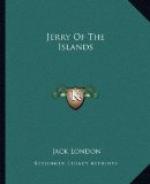The Arangi was a labour-recruit ship that carried the new-caught, cannibal blacks from remote islands to labour on the new plantations where white men turned dank and pestilential swamp and jungle into rich and stately cocoanut groves. The Arangi’s two masts were of Oregon cedar, so scraped and hot-paraffined that they shone like tan opals in the glare of sun. Her excessive sail plan enabled her to sail like a witch, and, on occasion, gave Captain Van Horn, his white mate, and his fifteen black boat’s crew as much as they could handle. She was sixty feet over all, and the cross beams of her crown deck had not been weakened by deck-houses. The only breaks—and no beams had been cut for them—were the main cabin skylight and companionway, the booby hatch for’ard over the tiny forecastle, and the small hatch aft that let down into the store-room.
And on this small deck, in addition to the crew, were the “return” niggers from three far-flung plantations. By “return” was meant that their three years of contract labour was up, and that, according to contract, they were being returned to their home villages on the wild island of Malaita. Twenty of them—familiar, all, to Jerry—were from Meringe; thirty of them came from the Bay of a Thousand Ships, in the Russell Isles; and the remaining twelve were from Pennduffryn on the east coast of Guadalcanar. In addition to these—and they were all on deck, chattering and piping in queer, almost elfish, falsetto voices—were the two white men, Captain Van Horn and his Danish mate, Borckman, making a total of seventy-nine souls.
“Thought your heart ’d failed you at the last moment,” was Captain Van Horn’s greeting, a quick pleasure light glowing into his eyes as they noted Jerry.
“It was sure near to doin’ it,” Tom Haggin answered. “It’s only for you I’d a done it, annyways. Jerry’s the best of the litter, barrin’ Michael, of course, the two of them bein’ all that’s left and no better than them that was lost. Now that Kathleen was a sweet dog, the spit of Biddy if she’d lived.—Here, take ’m.”
With a jerk of abruptness, he deposited Jerry in Van Horn’s arms and turned away along the deck.
“An’ if bad luck comes to him I’ll never forgive you, Skipper,” he flung roughly over his shoulder.
“They’ll have to take my head first,” the skipper chuckled.
“An’ not unlikely, my brave laddy buck,” Haggin growled. “Meringe owes Somo four heads, three from the dysentery, an’ another wan from a tree fallin’ on him the last fortnight. He was the son of a chief at that.”
“Yes, and there’s two heads more that the Arangi owes Somo,” Van Horn nodded. “You recollect, down to the south’ard last year, a chap named Hawkins was lost in his whaleboat running the Arli Passage?” Haggin, returning along the deck, nodded. “Two of his boat’s crew were Somo boys. I’d recruited them for Ugi Plantation. With your boys, that makes




